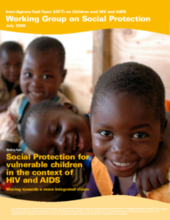Divergent views on how to conceptualize, formulate and deliver social protection continue to draw healthy debate, both in global policy circles as well as within the resource constrained, operational settings of many African and Asian countries. In the midst of these discussions, certain trends in thinking have begun to emerge.
First, social transfers (e.g. cash, food and other in-kind transfers) are a key component of social protection and have a central role in contributing to the protection, care and support of vulnerable children. The predecessor to this advocacy brief (see box at right) discusses the value of cash transfers in particular, and their real value for children affected by HIV and AIDS. The evidence to date points encouragingly toward the remarkable potential of social transfers for protecting the poor from the dire circumstances of destitution, and in particular for helping families and communities to better care for their children.
Second, social protection is also seen as an overarching framework, rather than a narrow set of social and economic support instruments. In line with this thinking, this advocacy brief proposes that in order to achieve maximum impact for vulnerable children, social transfers should be accompanied by a range of support services and policies that focus on family support, child protection, alternative care and livelihoods promotion. In particular, these services and policies aim to enhance social equity by improving the quality of support received and extending programmatic reach to those children who are most vulnerable and frequently overlooked. Often referred to as ‘complementary’ to social protection, these support services and policies should instead be considered essential components of any well-designed (or integrated) social protection package, since they enhance the potential of social transfers to deliver their full value.
This brief focuses on social protection in support of vulnerable children living in high HIV-prevalence contexts. More specifically, it discusses the crucial need to address social vulnerability, in addition to economic vulnerability, when formulating social protection strategies that address the care, protection and support of vulnerable children in the context of HIV and AIDS.
In October 2007, the IATT Working Group on Social Protection published the predecessor to this paper entitled Cash Transfers: Real Benefit for Children Affected by HIV and AIDS.
©On behalf of the Working Group on Social Protection for the IATT on Children and HIV and AIDS

